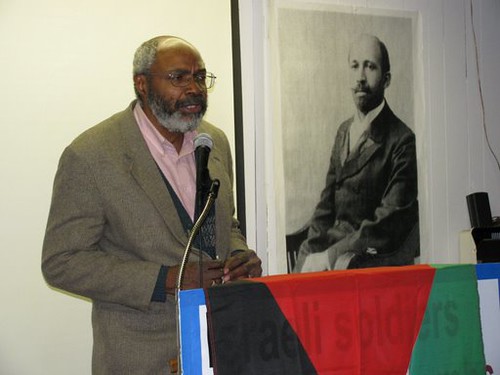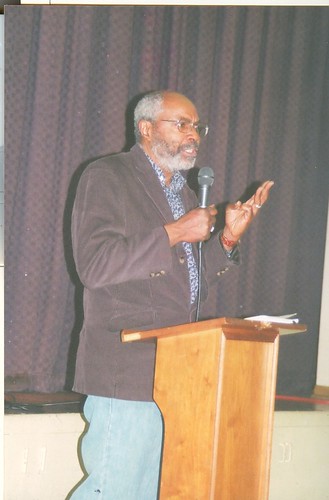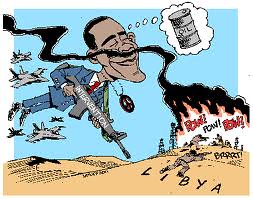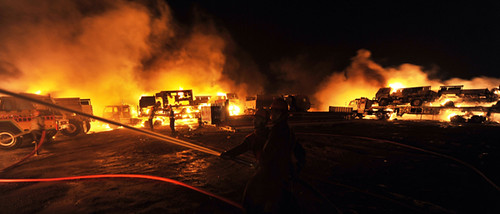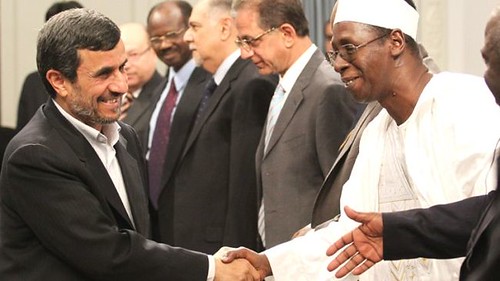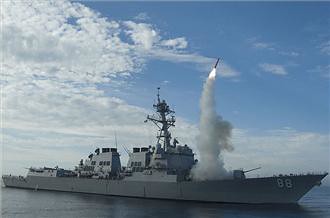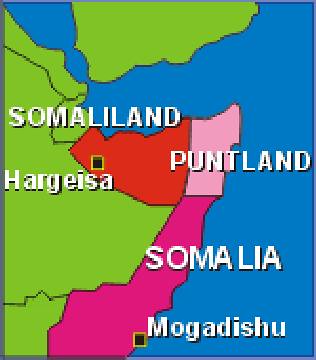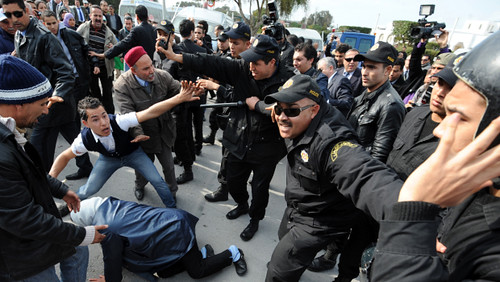Medvedev: Libya has influenced our position on Syria
Published: 30 July, 2012, 08:29
Edited: 30 July, 2012, 13:19
Last year’s military intervention of Libya by NATO forces plays a large role in determining Russia’s current stance on Syria, PM Dmitry Medvedev told The Times newspaper in an interview.
Speaking in London, host of the 2012 Games, Medvedev fielded a number of questions, including his impressions of the opening ceremony, the trials and tribulations of Pussy Riot, and his prospects for making another presidential bid.
Q: What did you think of yesterday's Olympic opening?
А: You know, actually, I liked it for several reasons. First, of course, it was a huge and expensive show. It was very, very well organized. Most importantly though, it was a British show. It was not Chinese, or American, or Russian. The atmosphere was genuinely British. I think the central theme (of course, apart from sports, Pierre de Coubertin’s ideas and various historical reminiscences) was British music. It was presented in all its glory. Considering that people all over the world, including Russia, love British music, I think it was a very good idea to use it as a common language, as a communication tool that a large number of people understand. I took a few pictures and posted them on Instagram. Most Russian people who watched the opening ceremony enjoyed it totally. They write in their comments basically the same things I’ve just said.
Of course, as we watched the ceremony, we thought about the future. Our opening ceremony in 2014 will be different, of course. It will be a Winter Olympics, and I think it should not be as long, because this one was more than three hours long. But anyway, I think the specialists who will be staging our ceremony will analyze it and pick up some general principles.
So to summarize, it was very interesting, and they had many good ideas. Rowan Atkinson’s appearance, for example, was really funny. I didn’t expect I would laugh at the opening ceremony. But he was really good and did a good job.
And, of course, the key moment, that is, the lighting of the Olympic Flame, is always very important. Each time, it is a big secret, because the organizers want to surprise everybody. This time, too, it was impressive, as we saw the baton passed from the older generation to young athletes. And, of course, when they lit this great number of petals and the flame went up, this was also unique and really impressed me. And then, of course, there were outstanding athletes like Steve Redgrave. We know him because he was in Russia for our regatta, and I even unveiled a rowing club together with him. So it was very interesting and highly symbolic. My congratulations!
Q: Will Sochi be learning some things from the London Games in terms of organization? Are you cooperating quite closely with London at this point?
A: I think it is absolutely necessary. We are already cooperating, and part of the reason for coming here was to see some things and discuss some things with our colleagues. We have a large delegation here. Some of these people, of course, are here to help the athletes, but apart from that we have the top officials from the Russian Olympic Committee and the key members of the government responsible for the Sochi Games here as well. And they came here not only to promote our Games, but also to exchange ideas and develop cooperation with our partners. I think this is very, very helpful. But actually we have been doing this for quite a long time.
Q: Mr. Medvedev, did you have a chance to talk to David Cameron? Have you had discussions about the state of Anglo-Russian relations? And how would you assess those relations at the moment?
A: When you come to the opening ceremony, your purpose, of course, is not to have fully-fledged talks. But thanks to the schedule our British partners had kindly prepared, I had a chance to talk to about 20 presidents and prime ministers yesterday. The first person I talked to was David Cameron. Given the circumstances, we had a pretty extensive conversation at Buckingham Palace. I can tell you frankly that we discussed everything from British beef exports to Russia, to Syria, of course. We talked about all sorts of things. Of course, I wished David and all the British people good luck with the Games. I said I was certain the XXX Olympic Games would be remembered by all, even though it is not easy for the city and the country in general to organize such an event.
Q: How would you characterize Anglo-Russian relations? They had a very difficult few years. You hosted Mr. Cameron as president. How would you say relations are now? Are there periods of tension that have remained?
A: On the whole, I think our relations are not bad. We did have a period of tension, but this was not the first time in the history of our two countries that this had happened and each time our countries and their leaders were able to turn the page and look to the future, because time goes on and the state of our relations has a serious impact on global affairs. Historically, our countries have been partners. At some points, we were rivals, but then at other points, like at the time of war, we were partners. So short-term difficulties should not make us forget the main thing. We have no other option but to cooperate in all sorts of areas, including economic issues, because we are all concerned about the situation on the global financial markets and in the eurozone. It affects both Russia and the UK. Fortunately, neither Russia nor Britain is part of the eurozone. But we trade with those countries a lot, and Britain is an EU member. This alone is enough to keep us in contact all the time.
As for other issues, there are always some international affairs on the agenda. We have consultations. I can say that it was quite easy for me to work with Mr. Cameron’s predecessor, Mr. Brown. We had a good working relationship, even though he often said, “We have differences on this subject.” This formula was used a lot, but still we had a good relationship. And now, I think both Vladimir Putin and myself have a good working relationship with David Cameron, and we can have a frank discussion on any subject.
There are some difficulties, but we don’t need to emphasize them. Otherwise, we may end up in a deadlock. Actually, I think those difficulties are temporary and insignificant. So on the whole I would say everything’s fine.
Q: You mentioned Syria. This is clearly one of the big international worries at the moment. Russia has had a number of initiatives in trying to solve the situation there. I think David Cameron has a very different point of view from your own point of view. But both sides agree that the Annan plan is perhaps the only political way forward. Do you think that plan still has a chance to succeed given the fact that things are moving so swiftly on the ground?
A: I don’t want to be overly optimistic because the situation is very difficult and very complex. But I don’t think that the Annan plan is no longer relevant, and the reason is because it is a political, peaceful plan. In fact, it may seem that the positions of Russia and Britain, or Russia and the US, are vastly different, but actually they are not that different. We all agree that a full-scale civil war in Syria would be the worst-case scenario. And what we have today is, if you will, the premonition of civil war. A huge number of people have been killed. As usual, both sides are to blame, because they would not listen to each other and come to the negotiating table.
I reminded David yesterday that I had told President Assad more than a year ago that he should act promptly and carry out reforms and, most importantly, build a relationship with the opposition, even though it may be difficult for him, even though he belongs to the Alawite minority, and most opposition activists belong to a different branch of Islam. Syria is a very complex state. It’s much more complex than Egypt or Libya because of all the communities living there: Sunnis, Shia, Alawites, Druze and Christians. They will either find a way to get along or civil war and killings will go on indefinitely. So both sides are to blame. They should come to the negotiating table and find a solution to this very difficult problem. I don’t know what the future political situation in Syria will be like, and I don’t know what role Mr. Assad will have in this future arrangement. It’s up to the Syrian people to decide.
The difference between Russia and Britain on this issue is that we believe talks are the only way, and our partners want to take more drastic measures. But the question is – where is the line between resolutions and a military operation? We saw that with the resolution on Libya. It basically led to international intervention. This is a bad way. Both President Obama and Prime Minister Cameron assured me this is not what they want. So I think the plan is not over, and we should cooperate and continue consultations.
By the way, I discussed the subject yesterday with the Lebanese leader and the Turkish prime minister. So as you can see, the Syrian issue remains high on the agenda even at the Olympics. And since according to the constitution it is up to the president to shape foreign policy, I think Vladimir Putin will present Russia’s position on this issue.
Q: You were president at the time of the Libyan intervention and the diplomatic proceedings that went before the Libyan intervention. Is that experience actually now influencing Russia’s position on Syria? Did you feel that you were somehow betrayed over the Libya scenario and that you don't want to see a similar situation in Syria?
A: Of course, this is influencing our position. In fact, when the situation with Syria started, I said from the very beginning that we would adjust our approach because of what happened with Libya. When the resolution on Libya was adopted, we thought our countries would hold consultations and talks and at the same time we would send a serious signal to the Libyan leader. But unfortunately it ended up the way it did. They kept telling us there would be no military operation, no intervention, but eventually they started a full-blown war that claimed many lives. And most importantly, I think it is a bad way to determine a country’s future. We all share democratic values, but imposed democracy usually does not work. Democracy must grow from inside. Only then does it enjoy popular support. So, what happened with Libya has definitely affected my position and continues influencing Russia’s position on the Syrian conflict.
I believe the past few years have been the most productive ones in Russia-US relations. And I am glad that during this period I had a chance to work with President Obama on resetting our relations. I think we have achieved a lot, even though we still have differences on a number of issues. This is how international politics works: each state is guided by its own national interests the way it understands them. The Americans understand them in their way, the British in theirs, and Russia understands its national interests in its way, too. As a whole though, those were very positive years.
I don’t think that we’ve entered a new era or that Russia is now taking a harder line with regard to the US, as the media claim. I don’t think that our priorities have changed or that the reset is over, that it hasn’t produced any results. This is completely wrong. It has produced many useful results, like the New START treaty. We had no treaty in place but we have one now, and it will determine our interaction for the years to come, even though we have our differences on missile defense. We’ve managed to reset a number of useful mechanisms. We’ve had many consultations on international issues.
This is the first US administration to help Russia join the WTO, and I will always be grateful to Barack Obama for being fair. I remember how one day we were in a car together, talking without interpreters, and he told me, “You know, I’ll help you join the WTO.” And he did. You don’t forget such things. This shows he’s a man of his word.
It is not like something terrible, or extraordinary, is happening in our relations. When some people say our position has changed, they usually do so for ideological reasons. I hope President Putin also has a good working relationship with Barack Obama. In fact, this is already happening. They keep in contact and they write and call each other. This is perfectly normal. Of course, I will do my best to help develop this dialogue as much as I can within the constitution. So everything’s fine.
Q: You mentioned missile defense as a sort of outstanding difficulty that remains between the two sides. Is there any sign that you will come to agreement on this? Or that the US is willing to accommodate your concerns?
A: I think the problem is that no one understands entirely what missile defense actually stands for. What about you – do you have a profound understanding of what missile defense is? I’m sure not. Nor do the Americans, as in, American taxpayers. And as far as Europe is concerned, I’ve been told in private by some of the European leaders, “We don’t want that at all, but the Americans as our senior partners in NATO are insisting.” And that means a lot of money!
But most importantly, there is a question that never seems to get a proper answer: who is the threat that the missile shield is intended to counter? If it’s meant to check nations that pursue unauthorized nuclear programs and design new missiles, then it’s something we can understand. But in that case you need to explain to us why this missile shield and its interceptor missiles can intercept targets coming from Russia – which means they affect our nuclear capability. Now, if the architecture is intended against us, you should go ahead and say so. But that would constitute a disruption of the nuclear parity that Russia has maintained with the United States to this day, and this parity has been a key factor in ensuring security since World War II.
And this is a question we’ve had trouble getting an answer to. The US administration and some European partners keep telling us, “You don’t need to worry, you and we are certainly friends and we collaborate through the NATO-Russia Council, so everything will be alright.” But at the same time, US lawmakers on Capitol Hill are openly saying, “Of course it is against Russia, who else?” There are certainly different people in the Congress, and I prefer not to specify, but the trend itself is very telling.
So I believe NATO should first make up its mind: what is it they really want from their Phased Adaptive Approach? That’s number one, and number two is, what is Russia’s intended role? Because they’ve already turned down the proposal I made at the Lisbon Summit, regarding a joint missile defense architecture that would involve Russia. This is truly regrettable, because that initiative would have enabled us to get past this debate and effectively secure ourselves against the nations that may pose a genuine threat to both Russia and NATO member states. So you’ve turned down that initiative, now why don’t you tell us what’s going to happen next?
There is still time. I’ve mentioned it, and so has our incumbent president. But that time is naturally running out. And unless we manage to agree on something by 2018, a new arms race may become a possibility – which would be extremely bad for all of us, expensive and badly inefficient too.
Q: Mr. Medvedev, I remember listening to you a year ago at the St. Petersburg Economic Forum, where you gave a very impressive speech about the future of the economy in Russia and, in particular, the dangers for your economy and the dangers from corruption. And you said that one of the things you would do is to make sure that if an official was accused of corruption, he would be removed from his job while an investigation was going on, to make sure there was no possibility. Do you think enough officials have been removed from their jobs to make it clear that you have overcome this problem? Or is there still a lot to do?
A: I still consider corruption a systemic threat to Russia, or any other country at that. But it is especially true of Russia, because we are a young democracy, and our economic institutions are still largely in the making. That is why I don’t see much progress on our part lately in combating corruption. Yet I have said publicly on many occasions that I’m very proud of having initiated a number of anti-corruption institutions that had simply been non-existent in Russia before. My years of serving as president and promoting the relevant initiatives have resulted in Russia developing anti-corruption laws. And that in itself is important, because it means we’ve acknowledged there’s a problem. Some five or seven years ago, it rarely even made it into public debate: well, yeah, we have corruption, but we’ve always had it. We had it in the Russian Empire, and we had it in the Soviet period. It’s still with us today, so just let it be – that was the sentiment.
Today, we are aware that this is a real systemic issue. We have the necessary regulatory instruments to deal with it. Thousands of public servants have already faced criminal investigations on charges of corruption, and a fair share of those cases result in actual prison sentences. Is that enough? No, it isn’t. We need to work harder and get down to the root causes, we need to upgrade our institutions, and we need to bring perpetrators to justice. By the way, I presided over a session of the Open Government recently, and this is essentially an expert panel set up specifically for such purposes. And the experts have come up with a whole list of new ideas, which I will certainly share with my fellow Cabinet members, and some of those proposals may eventually be implemented by the government.
But we need to keep on working. In principle, any society is confronted at some point or another by new forms of corruption, which government institutions and security agencies turn out to be unprepared for. I studied a review of the British press today, and I’ve noticed that corruption is a popular news topic in Britain, and corruption-related cases are given a lot of attention in London and in other places. This doesn’t mean corruption has gained in scale in the UK, but nevertheless, people are concerned. And that’s natural; people are also concerned about it in Russia. An absolute majority of Russians – no less than half, I’d imagine – regard corruption as a systemic risk for our society, and they believe the government should commit its efforts and its assets to combat this kind of crime. I am sure we’ll continue our work.
Q: You mentioned that Russia is a young democracy, and in recent months we've seen a real flowering of civil society activities, many of which you have responded to and encouraged through changes in the law to make it easier for political parties to register, and other things like that. More recently there's been concern though about laws which appeared to be going in the other direction, registering NGOs as foreign agents for example, imposing tighter restrictions on demonstrations, and the most recent case involving the Pussy Riot girls who are accused of hooliganism. Do you feel that that this criticism is justified, that Russia is somehow becoming less free, or do people really not understand what's happening in Russia?
A: You know, it seems to me that sometimes people just start believing in some phantoms and following some stereotypes. Personally, I don’t think anything special has been happening in Russian legislation in recent months. But if someone wants to prove that Russia has returned to totalitarianism and is rolling back civil rights, it will be very easy for them to find some proof because actually you can do that anywhere, in any country. For example, you mentioned the NGO bill. But the bulk of the bill the State Duma has adopted merely repeats what similar laws in a number of other countries, including the US, say. That’s my first point.
Second, the term “foreign agent” in itself is not a charge. It just reflects the fact that this NGO receives funds from abroad. It is only natural for a state to be concerned by political activities financed from abroad. It is the same all over the world, including the UK and the US. So I think there is nothing wrong with introducing some regulations in this situation. In fact, this law has yet to be applied. I am absolutely convinced that it will have no significant effect on the activities of NGOs involved in politics, let alone those involved in economic and cultural issues. So, we have this bill, but it hasn’t been implemented and so I think there is nothing to argue about. And even if we run into some problems, our lawmakers will be able to adjust this law and this includes the majority party that actually passed this law.
As to other high-profile issues, including the trial you’ve mentioned. Again, I think there is no reason to get excited. No sentence has yet been passed. The case is still under investigation. Indeed, there is a wide spectrum of opinions. In some countries such actions would have entailed far greater criminal liability. In fact, in some countries anyone who committed an act like this in a temple could have come to a rather sad end, no matter what religion the temple belongs to. But in any case, let's wait for the investigation to be completed and for the court to pass its verdict, and then we will be able to say whether there was a crime or not. It is easy to understand why this case has sparked so much controversy. It has to do with how we understand individual rights and freedoms. As I see it, there will always be differences on where to draw the line between ethics and law and how to define when an immoral act becomes a crime. And this is up to the court to decide. It is up to the court to rule whether there is a corpus delicti, in other words, elements of a crime. If there are none, this is a piece of real luck for the perpetrators: they hit the headlines and got away with what they did. But I do understand that for some of these girls being kept in prison is a real ordeal for them and their families.
Q: I was going to ask – you clearly as president introduced quite a few reforms to encourage civil society. Do you feel that civil society is healthy in Russia or is there more that could be done to promote political diversity, political pluralism?
A: On the whole, I think our civil society is getting more and more mature. When I ran for president in 2008, our civil society was less developed. Today our civil society is much more developed, diverse and active. This means our democracy is maturing and our civil society is growing.
Our people were extremely active during the Duma and presidential elections. This shows that they care about their outcome. This doesn’t mean I agree with everything that was said during that period, or that all the accusations against the authorities were false. But in any case it is good that people are so active in expressing their position, provided of course that they don’t break the law. And the authorities should engage in a dialogue with people.
By the way, all the changes to our political system that I presented in December are another result of the development of our civil society. So, I find it ridiculous when people talk about a “rollback” in Russia, or that Russia has abandoned democratic reforms, as we have actually solidified the foundation of our political system in recent years and even improved it.
We have radically changed our regulations for political parties. There will be many political parties now and they will be free to do what they want – again, as long as it is legal. We have reinstated elections for governors. Has anybody cancelled that? No, on the contrary, we are getting ready for these elections, together with the leaders of other political parties. I’ve recently met with the leaders of a number of other parties besides United Russia – of which I am the leader – and they are all preparing for the elections. They all are considering their chances in different places and they are very hopeful. Don’t you agree that this means our political system has changed? Don’t you agree that civil society is developing? So, I think we are doing fine.
Q: Just a final question – two final questions, one from me…
A: Three final questions?
Q: Thank you. You are famous for sending out tweets and directly responding to people who have called in to you. This is direct democracy in action. Do you have time to do that? Do you have time as prime minister now do you think to respond to all the young people who want to talk to you?
A: Absolutely. Right now, absolutely.
Q: Do you think Russia has embraced the whole Internet revolution? Oh, goodness, here we are – broadcast live. Do you think that the older generation has fully understood the complete need for absolute transparency in this kind of direct response from senior officials?
A: You know, this thing I’ve just shown you, and the new information environment in general, is the best safeguard against totalitarianism and a return to our sad past. No government in any country, even in some very complex areas like the Arab world, can ignore the omnipresent communications network that is emerging and developing whether the authorities like it or not.
By the way, the reason the authorities don’t like it is simply because people use it to criticize the authorities, and nobody likes that. I remember what some said about Twitter when there were riots in London. But nobody can do anything about it. We just need to create a proper legal framework for social networks. But you can’t block them. This means that a modern and up-to-date leader can’t afford to ignore this new information environment. Every leader should keep track of what’s going on there.
I think a successful politician must have direct contact with people. In the past, you had to physically go some place, step outside and meet people, and everybody, from emperors to prime ministers and presidents, did that. But this way you can only meet with people once or twice a month and you have a crowd of people standing around you, screaming something, and, of course, you can hear something but there are many things you can’t hear. As a result, all you can get is just bits and pieces. This is totally different.
Every day, I read at least 50 messages left for me via Facebook, Twitter, other social networks or even my website. If it is something important, I issue direct instructions. Sometimes in the morning, before I go to work, I go online and see something very urgent, something truly important. And then I print it out and write my instructions right on this sheet of paper.
In the past, it was unthinkable that the authorities could have this kind of direct interaction with people. I think this is very important. I repeat, if a politician can’t master these tools, he has no future.
Q: That leads actually very nicely to my final question which is: clearly you had an opportunity for a second term as president instead of becoming prime minister. Do you have any regrets about not pursuing the second term and might there be a second term in your future?
A: You’ve answered the question yourself. I am not that old. I am not going to resign from politics any time soon, and I have never said I will never run for president again – of course, as long as our people want me. If our people decide that they have had enough and they tell me good-bye, I’ll take up writing my memoirs.
But I strongly believe that at present there’s no reason for me, or for the political force I represent, to quit politics. So, I don’t rule out anything. Even today, I am very actively involved in politics, I work a lot, and I expect to keep doing that.
Thank you very much. I wish the people of Britain a wonderful Olympics I am sure people will remember it as another achievement in promoting the values of the Olympics, will remember its brilliant victories, the spectacular athletics events and British hospitality.
